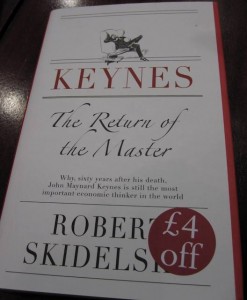I’ve been reading Robert Skidelsky’s new book on Keynes, which is absorbing and well-written. I never accepted (as most of the neo-con economists did) that Keynes had been overtaken by history, as it were and Skidelsky backs that up by picking out three Big Ideas from Keynes which, he thinks, have an enduring resonance. They are:
1. The future is unknowable, so economic storms, especially those originating in the financial system, are not just external shocks which impinge on smoothly operating markets, but part of the normal working of the market system. (This is something an engineer would know intuitively, so it’s always been a source of amazement to me that economists and investors seem unaware of it. Market capitalism is an intrinsically unstable system.)
2. Economies wounded by these ‘shocks’ can, if left to themselves, stay in a depressed condition for a long time. (As the Japanese know to their cost.)
3. A moral critique of societies which worship the pursuit of money and efficiency above all other objects of human striving. I thought of this while passing the Cambridge Arts Theatre, which Keynes was instrumental in founding. In a way, it’s the most profound of his ideas, and the one most flagrantly ignored in the last two or three decades.
Skidelsky has a lovely Coda in his Preface in which he writes:
“Once I started writing this book, on 1 January 2009, I stopped reading the newspapers on a daily basis to avoid filling up my mind with ‘noise’. Any coherence my argument may have stems from this act of self-denial.”
No wonder I am sometimes incoherent. I read too many papers.

